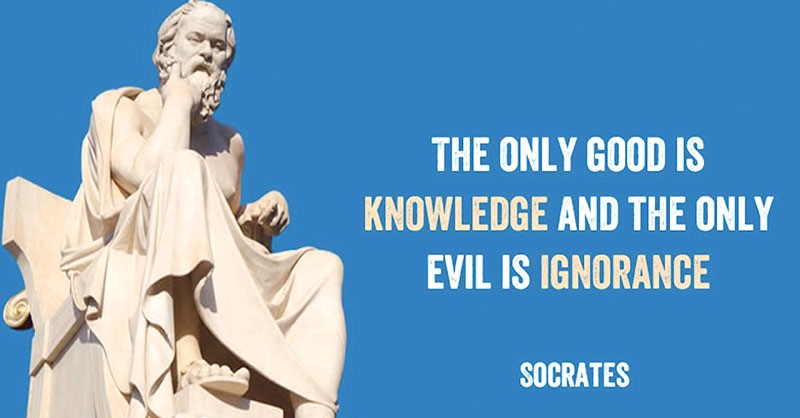
He believed that true knowledge came from questioning one’s beliefs and assumptions
SHOUKAT LOHAR
Socrates was a Greek philosopher who lived in Athens from 469/470 BC to 399 BC. He is widely regarded as one of the most important figures in the development of Western philosophy, and his ideas continue to influence modern thought.
Philosophy of Socrates
Socrates did not leave any written works, and much of what is known about his philosophy comes from the accounts of his students, Plato and Xenophon. Socrates believed that the pursuit of knowledge and wisdom was the most important goal in life. He believed that true knowledge came from questioning one’s beliefs and assumptions, and that this process of questioning could lead to the discovery of universal truths.
Socrates’ method of questioning, known as the Socratic Method involved a series of questions that helped to clarify and refine one’s thinking. He believed that the process of questioning was more important than the answers themselves, and that the pursuit of knowledge was a lifelong journey.
Socrates was also known for his emphasis on moral and ethical values. He believed that living a virtuous life was the key to happiness and fulfillment, and that virtue could be learned through discussion and reflection.
Relevance Today
Socrates’ philosophy continues to be relevant today, particularly in the fields of ethics and education. His emphasis on questioning one’s beliefs and assumptions is a cornerstone of critical thinking, and his emphasis on moral and ethical values remains an important part of many philosophical and religious traditions.
Socrates’ approach to education, which emphasized the importance of dialogue and questioning, is also relevant today. Many educators now use the Socratic Method as a way to encourage students to think critically and engage in meaningful discussions.
 Did Socrates reach the crux of what’s called Truth?
Did Socrates reach the crux of what’s called Truth?
Socrates believed that the pursuit of knowledge and wisdom was a lifelong journey, and that true knowledge was elusive and difficult to attain. He believed that the process of questioning was more important than the answers themselves, and that the pursuit of truth was a never-ending process.
While Socrates did not claim to have found the ultimate truth, his philosophy and approach to questioning helped to lay the groundwork for later philosophers and thinkers who sought to uncover universal truths about the world and human existence.
Why did Socrates drink hemlock?
Socrates was sentenced to death by the Athenian government on charges of corrupting the youth and impiety. Rather than flee or seek clemency, Socrates chose to accept his sentence and drink a cup of hemlock, a poisonous substance.
Socrates’ decision to accept his sentence and drink hemlock has been the subject of much debate and speculation. Some have suggested that Socrates believed that it was better to die than to compromise his principles or betray his beliefs. Others have suggested that he saw his death as a way to demonstrate the ultimate power of philosophy and the pursuit of truth.
Conclusion
Socrates was a philosopher who believed that the pursuit of knowledge and wisdom was the most important goal in life. His philosophy emphasized the importance of questioning one’s beliefs and assumptions, and his approach to education has continued to influence modern teaching methods. While Socrates did not claim to have found the ultimate truth, his ideas and approach to questioning continue to be relevant today, and his willingness to accept his sentence and drink hemlock has become a symbol of his commitment to his beliefs.
_________________
 Shoukat Lohar is Assistant professor in English at Mehran University of Engineering and Technology Jamshoro. He can be reached at Shoukat.ali@faculty.muet.edu.pk
Shoukat Lohar is Assistant professor in English at Mehran University of Engineering and Technology Jamshoro. He can be reached at Shoukat.ali@faculty.muet.edu.pk